Tumbling Dice

Scattered across the New York City subway system, strewn between its millions of comers and goers, are thousands of long-term loiters, perpetual itinerants, and permanent subterranean residents. Of these, many are veterans of the city’s mental wards. Many are visibly disturbed, and potentially volcanic. Some still sport their plastic ID bracelets.
These are the patients that precincts play pinball with, the ones whose crimes aren’t based in reality, so arrest has no effect, and NYPD catch-and-release bail reform has them back on the streets by morning. Tonight, in the Port Authority Bus Terminal, by where I sit in the underground waiting area, a shirtless man swats at daymares and talks shit to life. Another faces a wall, stomps and weeps in tongues.
I’m one lurch away from these man mines, a third at the Trailways gate is pacing and moaning. My bus to Atlantic City, Greyhound’s Lucky Streak — the $20 one-way to any casino with a $20 slot credit, the every-day deal now in its twenty-fifth year—is running a few tads late.
I’m no fan of breathing air you can taste the brake powder in, but this still sure beats those Chinatown casino buses. Like that one that underestimated a low Bronx highway overpass at full speed, shearing its top off, killing 15 passengers, decapitating at least one. Or that one that tipped over changing lanes on the Garden State Parkway, and tumbled side-over-side down a steep embankment into a quarry, killing 8. And the other one that head-on smashed a concrete pillar on the Jersey Turnpike, sending the driver through the windshield, and killing two others.
And none of those offered slot credits!
That was early-2010s though, the height of Chinatown casino bus conveyor belt culture, exhausted drivers trafficking compulsives who gamed all night, slept on the way back, then went straight to work. Gambling is now legal in 44 states; in New York, a fortune can be won or lost on the toilet, poking at apps until your feet feel invisible. Suffice to say, bus demand has lessened.
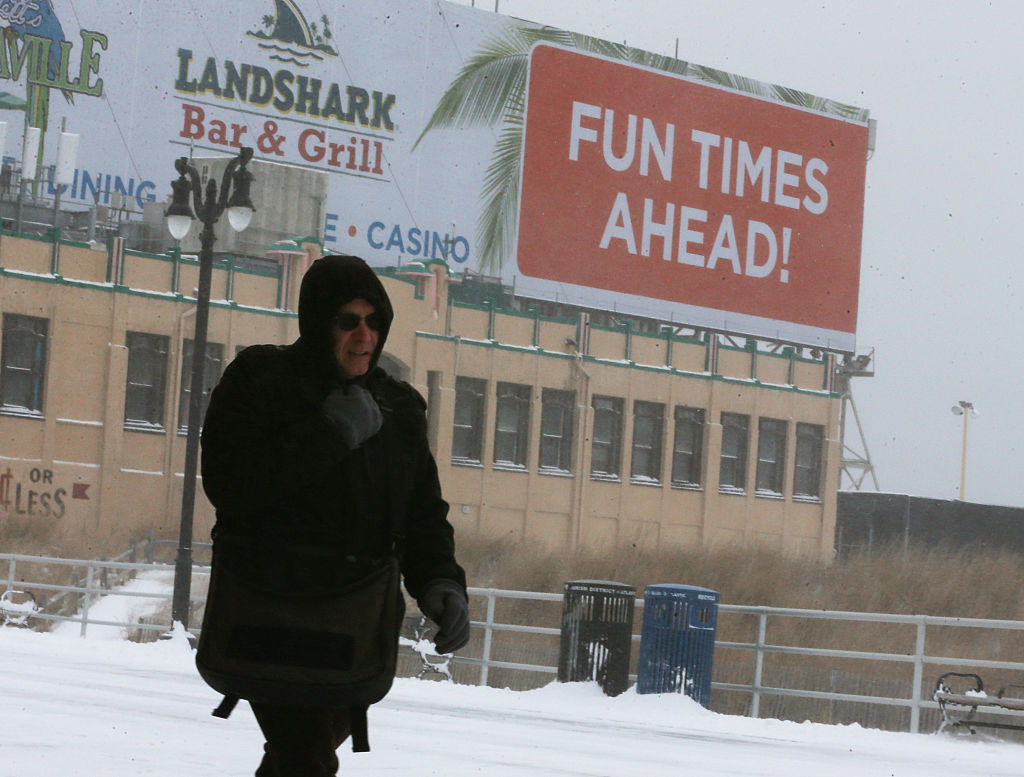
Still, the Streak thrives. It’s clean, with free wi-fi, bottled water, a decent wreck record, and is perfect for New Yorkers who still desire what Greyhound calls that “classic AC gaming experience”—whatever the hell that is these days. I don’t desire it. I’m just visiting to study the cadaveric spasms of America’s first beach town, to pound her torpid boards and to prowl her frail casinos.
Admittedly, I’m no gambler, though I am quite familiar with the Lucky Streak, having rode the lightning en route to Jersey Shore vacations for thirteen years and counting. It’s safe to say that by this point I can identify most all of its rider types, and once our bus finally does arrive, one by one, we board—
There’s the wrinkled, grinning South American man in a Guayabera shirt and Panamanian fedora, who goes by his last name only. He streams marimba and sings along, eyes closed, conducting the congas with his slot ticket (“El oro es buenooo…pero tú eres mi amorrr!”)
I see the gamey, wayfaring women in cutoffs, rank with vodka. Voices deepened octaves by cigarettes, prune-faced and jittery, they brag of stretching slot credits for hours while hoarding comp drinks (“That’s what you call a lucky streak, Diane!”)
Here’s the wispy, white finance bro in pricey headphones, who streams pro poker the whole trip. A catastrophic sports bettor, he keeps five browser windows open monitoring his silly parlays. Slot credits are hobo’s piss to him, a “gaming investor”. He keeps silent and mouths trap lyrics.
We have the gorgeous Jamaican women that blast reggaeton on cracked phones, dancing with no one. They all tell the same story at once, laughing at high volumes. Slot credits tucked in their tank tops, they brag of bottle service tabs paid for (“Gurl, he knows how we get down!”)
And we have the loner randoms, the quiet readers and scrollers, of whom I’m the only one today. Our driver makes his unintelligible announcements, climbs behind the axe-proof plexiglass wall that separates him from us, and we’re off—West 39th to Route 495 into the filthen mouth of the Lincoln Tunnel.
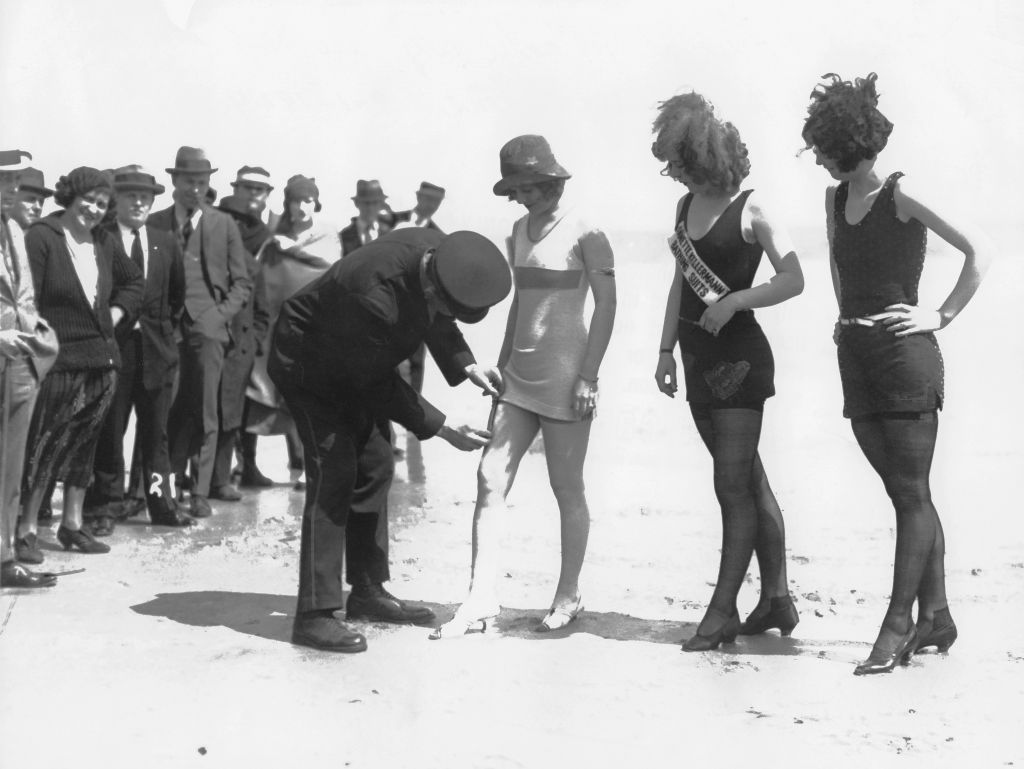
THE LEGACY
Along the traffic loop snaking up from Manhattan’s out-pipe, one rarely finds a casino billboard. Casino app billboards, sure, many. But for decades prior, a rider couldn’t blink in Weehawken without AC being dangled in royal fonts and luscious colors:
Instant Reward Slot Clubs, Wager-Match Blackjack, Triple Poker Bonuses! Champagne Breakfasts, Free Suite Upgrades, Lobster Buffets! Legendary Songstress So-and-So, Epic DJ This-and-That!
These days, you’re well past Secaucus until AC billboards appear — and outnumbering them four to one, in somber fonts with muted colors, are billboards for rehabs, pawn shops, criminal law services, “Jesus Saves”, and the omnipresent WeBuyAnyCar.com
In 1850, Atlantic City was founded as a health resort for immobilized urbanites to benefit from clean ocean air and sun. Its first commercial hotel opened in 1853, the following year municipality was granted, railroads were extended from Philadelphia, and the town began to blossom.
The world’s first boardwalk was built in 1870 as a sand buffer between the beach and hotels. It rapidly grew popular as a business platform, by 1885 was two miles long, amusement piers were later added, and by century’s end nearly 500,000 guests were visiting AC annually.
During the early-1900s a dozen boardwalk hotels went up, and when prohibition hit, it went unenforced under the OK of political boss Enoch Lewis ‘Nucky’ Johnson. Backroom gambling began, AC billed itself as “The World’s Playground,” and the boardwalk grew to 7 miles in length.
The Roaring Twenties were glorious, the Great Depression killed the party, and in 1944, a hurricane erased half the boardwalk. Post-WW II, the boards rose again and AC returned, hosting the likes of Marilyn Monroe, Frank Sinatra, Dean Martin, and the Beatles.
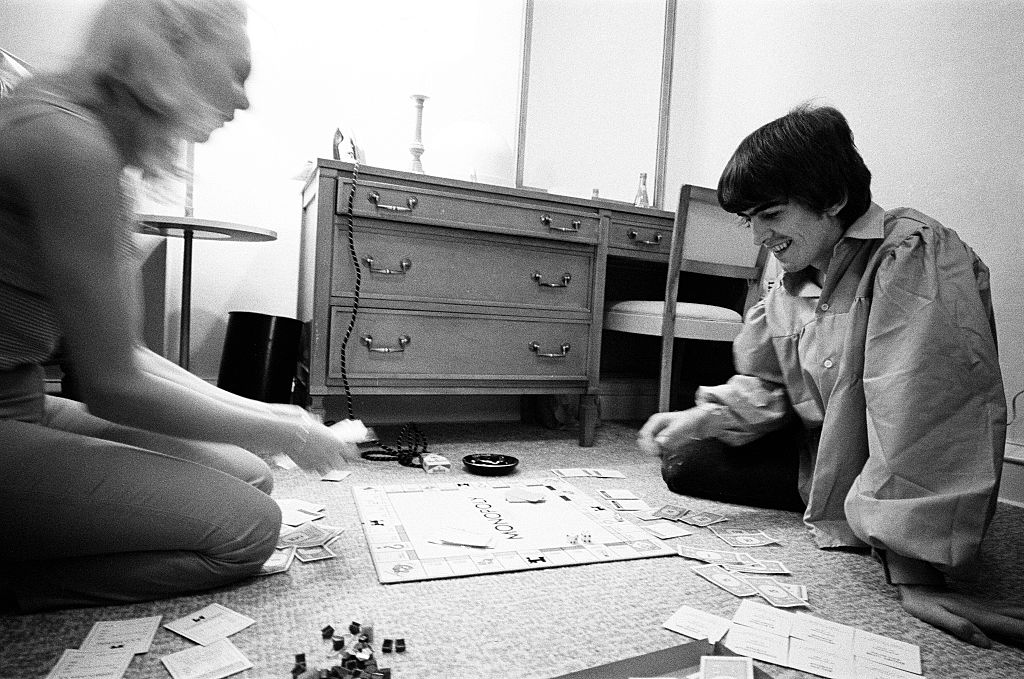
By the early ‘60s the entire middle-class had cars, and AC’s long-stay tourism became come-and-go. Cheaper flights saw Americans choosing tropical resorts over seasonal spots like the Jersey Shore, and with the ‘70s approaching, AC’s hotels and boardwalk fell into disrepair.
Hotels closed left and right as the ‘70s progressed, crime rose, and in 1976 gambling was legalized as a save for the city. Two years later, Resorts International opened as the first legal casino outside of Nevada, setting the stage for a late-century Atlantic City revival.
By the early-80s, AC was a top gambling destination, boasting Steve Wynn’s Golden Nugget, Hugh Hefner’s Playboy Club, Trump Plaza and Trump Castle. 1990 saw the world’s largest casino open, the Trump Taj Mahal, where Donald cut the ribbon with Michael Jackson.
In 1995, AC hosted 33 million visitors and its 13 casinos made $3.7 billion, more than the 40 Vegas Strip casinos combined. The city however, suffered. Casino hotels kept guests carefully contained, so local shops, restaurants and businesses bombed — save for pawn shops.
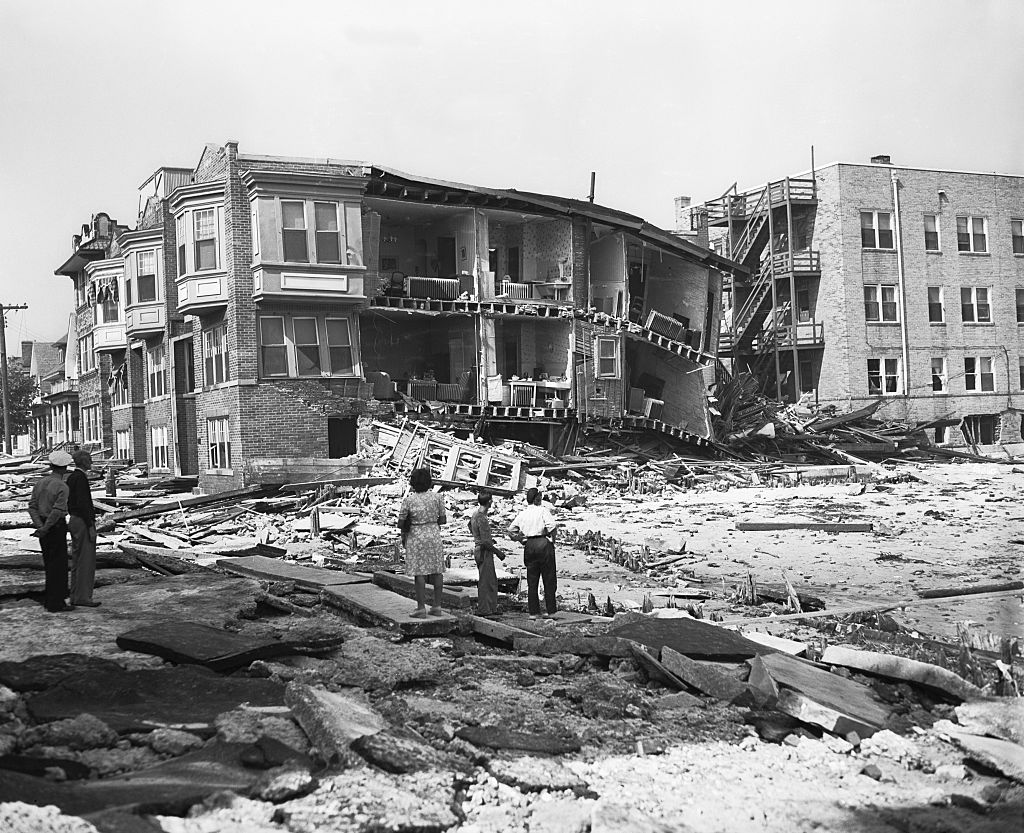
Pennsylvania opened several casinos near Philadelphia in 2006, and within six years, became the second highest-earning casino state, behind Nevada. The financial crisis of 2008-09 hit AC hard, and in 2012, Superstorm Sandy again proved its vulnerability to severe weather.
Between 2006 and 2013, casino revenue dropped from $5.2 billion to $2.9 billion. From 2013 to 2015, four casinos closed in 18 months, AC’s unemployment rate became one of the nation’s worst (13.8%), and in 2016, the Taj Mahal dealt its final hand.
By 2021, the empty Trump Plaza was literally falling apart, and had to be imploded. Post-pandemic, 1 of every 3 jobs in AC was lost, and crime rose to 12x the US average per capita, with one of the highest murder rates. 40% of residents currently live in poverty.
Some depressing shit, right? How about this ad that I’m served when a documentary I’ve been watching ends? Depends brand “Player’s Advantage” casino diapers are billed as a way to keep your lucky streak going without having to visit the bathroom, providing “an additional 10-12 hours of continuous play”.
Now that is depressing shit, on so many levels.
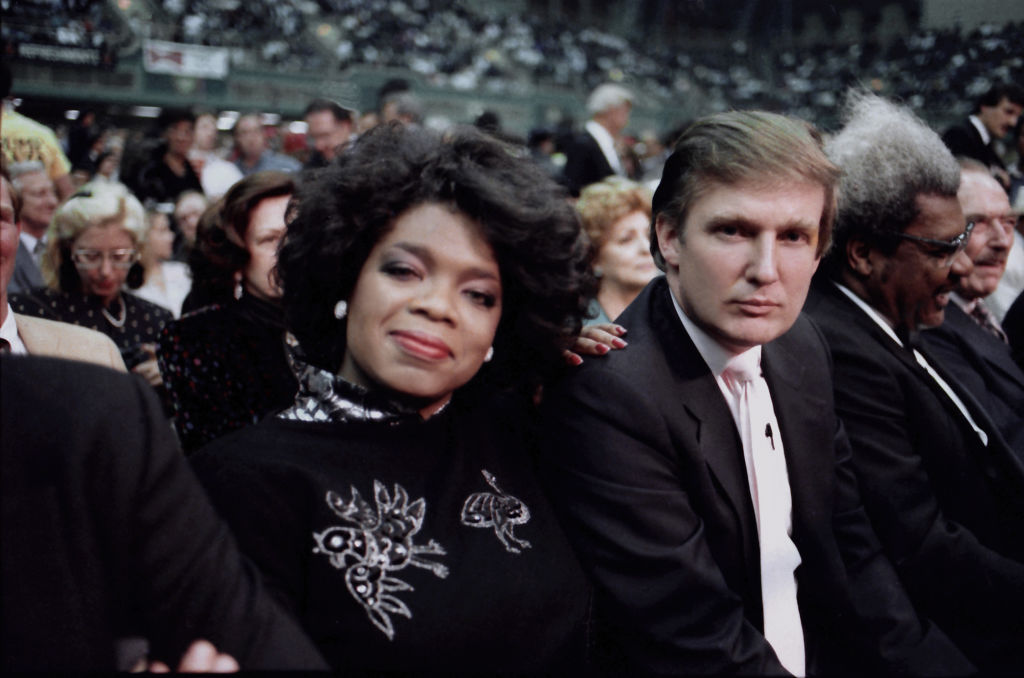
THE BOARDWALK
During my night in Atlantic City, I’ll occupy a room above AC’s oldest watering hole and pizza joint, Tony’s Baltimore Grill, in operation since 1927. Tony’s bar is 24-hour, featuring $2 beers, $4 mixers, and plenty of hard-working faces with lives you’ve never lived, or ever will.
I greet Tony’s manager Joe at street level on the building’s flank. He unlocks an impenetrable, undercarriage-sized iron gate guarding the stairwell leading to their upstairs apartment. We immediately speak of safety.
Pacific and Atlantic Avenues (we’re on the former), are the two main drags that parallel Boardwalk. They aren’t snake pits in our area, but most perpendicular side streets — the ones named after the States in Monopoly — get rather unpleasant at night.
“Florida Ave., Texas Ave., Georgia Ave.—you want to stay away from those. Iowa is safe near the water, because it borders the Tropicana. The start of Pennsylvania, that’s sort of ok, Hard Rock is there. Ocean Ave., the part near Resorts casino, that’s alright.”
He pauses. Then again, during his first month living on St. James Place, right next to Hard Rock and Resorts, five shootings and two suicides happened two blocks from his bedroom. The sirens didn’t stop for five months. It all got to be too much, so he bailed.
So actually, Joe says, scrap all that. “Just keep to Boardwalk at night, with all the lighting and 24-hour surveillance. Because, honestly, even walking to Boardwalk from here in the daytime, things can get gnarly, quickly.”
Moving beachward on Iowa Ave. is unsettling. Empty shops, shady motels and pawn joints abound. Plastic bags tumbleweed by, and it feels like multiple someones are watching. Twice, a jaw-grinder with dreadful tats scuttles by murmuring, in a serious rush. Three cars go by, and a bus. Mind you, this is late afternoon.
I hit the boards below Morris Ave. and find a phantom realm. A dense, cottony fog rolls off the ocean, and I’m the only human in sight. The former Atlantic Club, a block-long casino and its 23-floor hotel towers have been left to rot. Storefronts small to massive are deserted. The Claridge Hotel’s former casino sits abandoned as well.
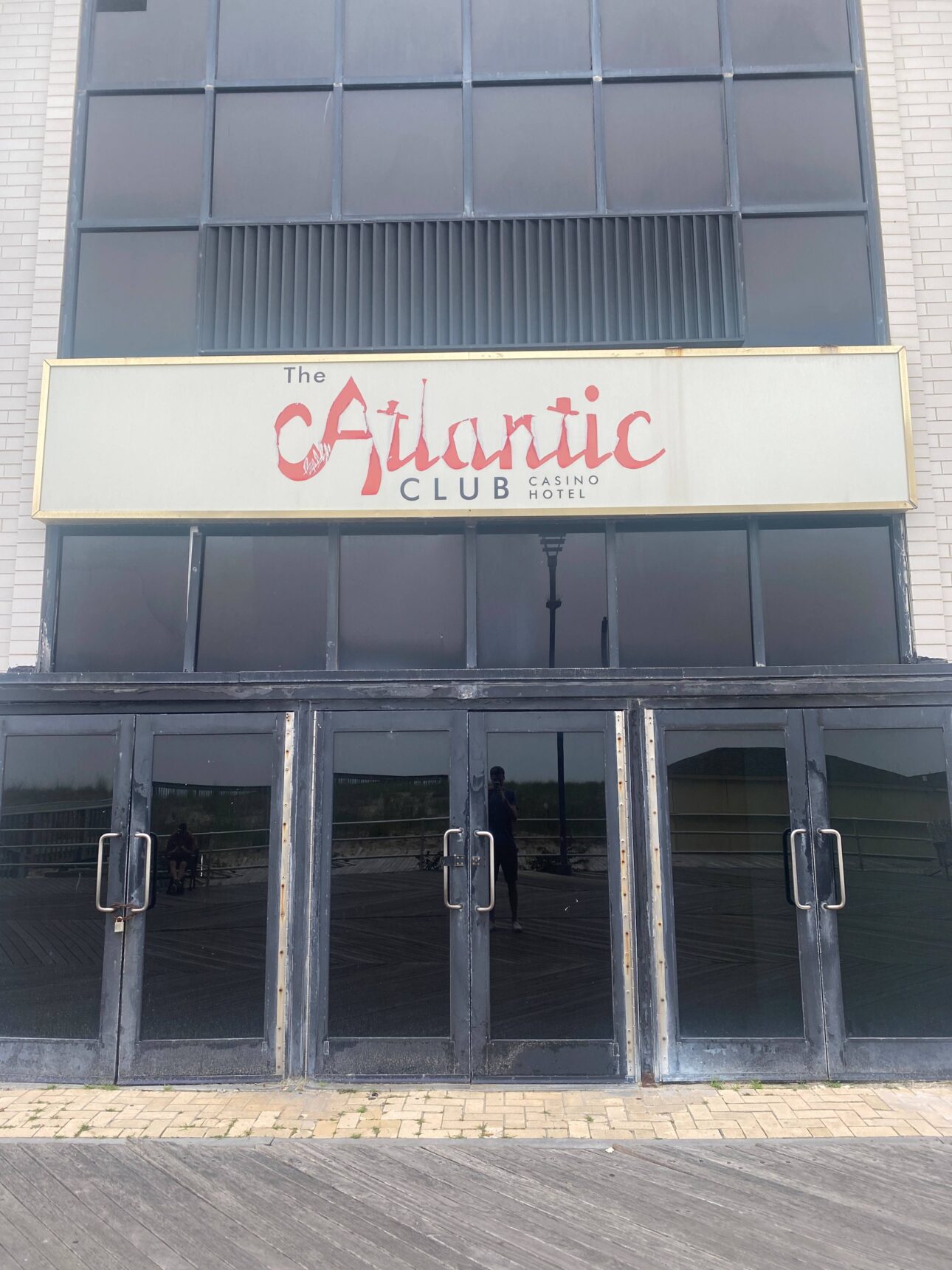
A five-minute walk north finds a reasonable crowd. The Tropicana, pizza places, an ice creamery, some souvenir shops. Behind the AC logo tees and beach gear though are wall racks of samurai swords, machetes, and gas station psychedelics — suspect Chinese cannabis vapes, creepy “Mushroom Guide” gummies, chem-treated Delta 8 joints, and whatever the hell Kratom is.
As I ponder the hell these bunk drugs must summon, an avian mass dive bombs, ripping hot pie from hands, mouths and tables. It’s a seagull swarm alright, but these aren’t the Jersey Shore gulls I grew up with. These are Hitchock-level fowl, with obsidian orbs for eyes, and huge, veiny feet. They caw bloody murder and scrap midair like Game of Thrones dragons.
Three low-flyers wing an elderly man in the face and don’t miss a flap, his Ray Bans go flying. Several hover in place, seeming to shit on purpose. A Hispanic girl gets shat on and loses her mind, her dad thinks its hysterical. A monster gull screams and battles squirrels for a popcorn bag (with no trees in sight).
I guard my face like a boxer and push on.
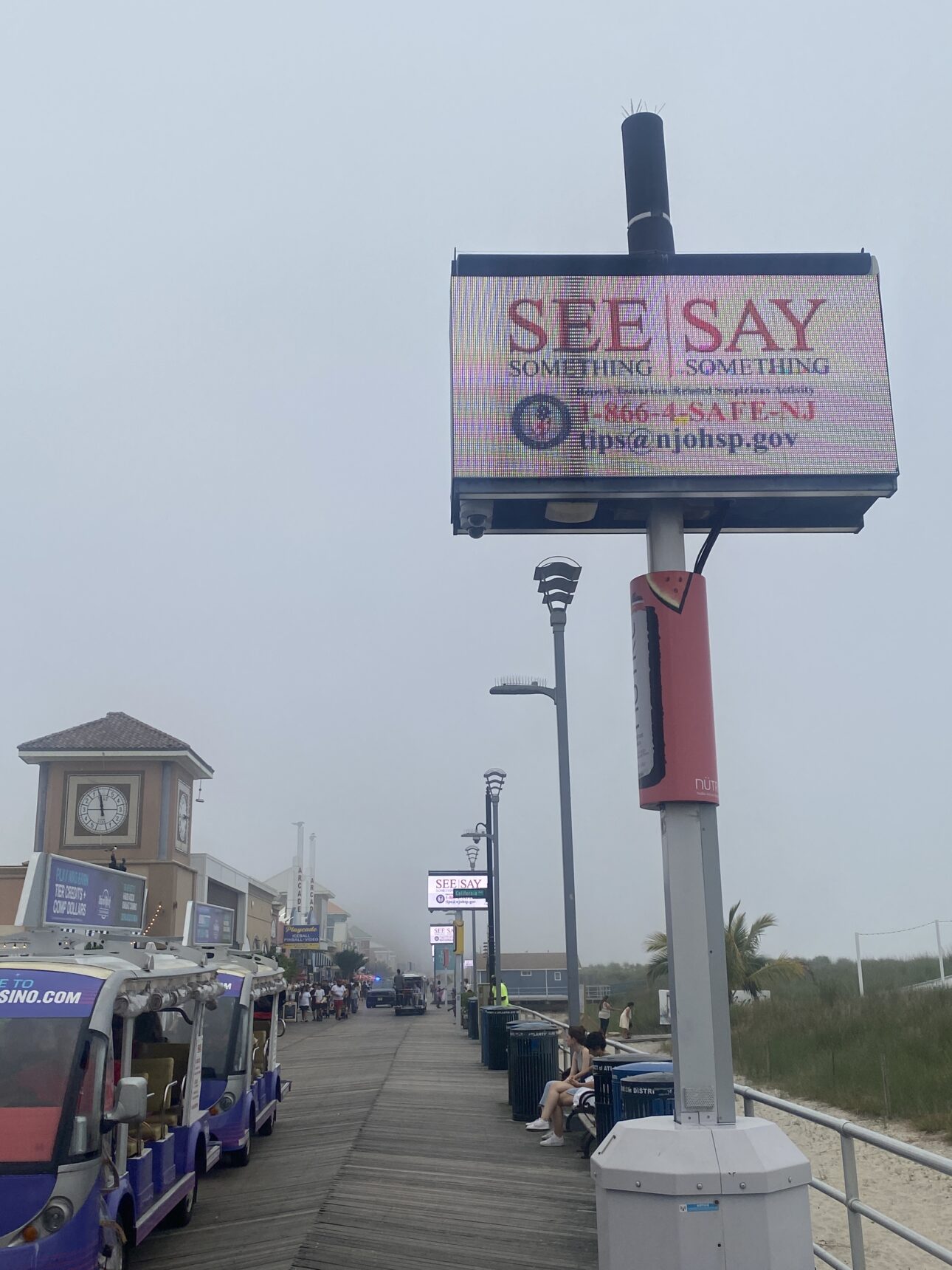
The fog begins to part at the boardwalk’s Belmont Ave. intersection, and roughly one story up, beachside, fifty consecutive digital billboards,what the city calls “The World’s First Smart Boardwalk Digital Structures”,become visible. As far as the eye can see, they all play a “See Something, Say Something” bulletin in perfect synchrony.
A casino ad follows, a sleazy-lady voice over frenzied slot sounds and bad EDM. Then a silent ad for Cinch Rodent Traps, with a video of a groundhog peeking from a hole. Multiple ads follow, all loop, and the WeBuyAnyCar theme is heard above all else on the boardwalk every few minutes for the rest of the night.
Amidst the scant crowd of typical beachgoers, I notice quite a few perma-stray fifty-somethings, the Tom Hanks in Castaway type — human driftwood, skin like baseball gloves, the east coast genus of the Venice Beach vagabond. They wander about holding tall cans, gone, unreachable.
Many normal folks I encounter are in motorized wheelchairs, but seem too young to be. Lots are remarkably obese. They peter and putter by at the speed of an escalator. One keeps sounding a buzzer, as I’m not watching my walk. Oddly, this traces to AC’s roots. When founded as a health resort, its first guests were all ill city folk confined to wheelchairs. They came for healing though, not indulgence.
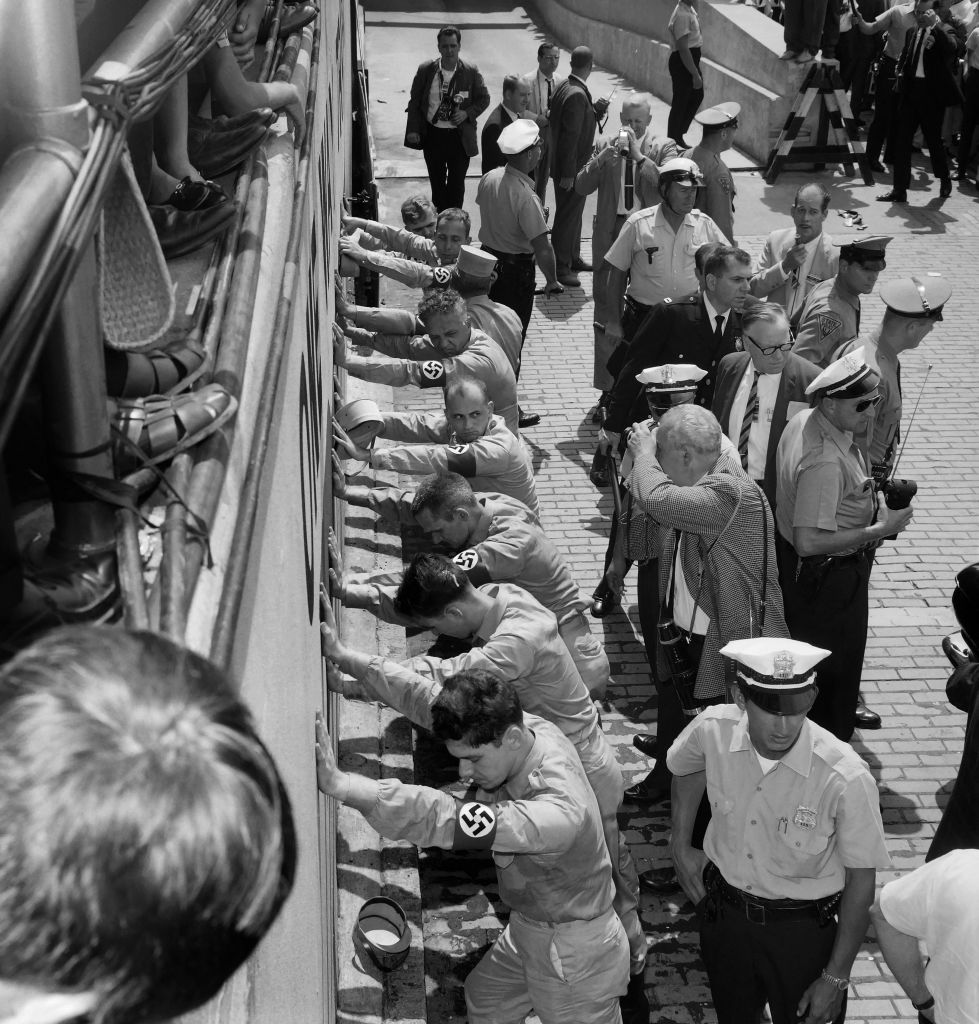
THE CASINOS
I enter Bally’s Hotel & Casino, and spot three riderless handicap scooters in the near-empty entry hall, where bellman talk about the just-concluded July 4th weekend. Another two scooters sit by the unattended check in. Way too few guests sit at the bar, an old man in a leisure suit sleeps in a booth. It’s got to be post-holiday fall-off, plus it’s a Tuesday—active businesses don’t look like this.
Past the elevators is a vast, open space with a Damask-patterned carpet in out-of-production colors, stained with tarns of Lord knows what fluids. The smell of used pink urinal mints and ancient cigarettes drifts by, and deja-vu strikes mightily — multiple stays, early-2000s, toppling drunk with grooms-to-be. Bally’s, once our bachelor party mecca, is now a void.
Towards the casino, the VIP Registration Room and Player’s Club booth are closed, as is the High-Stakes room. The sports betting halls are reasonably active, though at a dozen gaming tables dealers stand and stare, waiting with hands clasped at the waist. The only area with a booming population is the video slot Valhalla to my right.
A decent amount of elder players stream by me, many with mobility problems. A man clings to a cane with a golden cobra handle, two women push walkers, another drags a limp leg. All seem truly entranced by the soft, light chorus of strange, echoing dings. I follow them down a ramp into a bright dopamine farm of gleaming adult children’s toys.
There are machines with brawny German beer maids, flawless Chinese geishas, Manchu emperors on golden buffalo. Monks ringing gilded gongs, bejeweled sarcophagi, cherubic infants riding fireworks. Pirate parrots with rainbow tails, friendly seals with baby’s eyes, possessed pinatas, drunken mariachi, and genial cows in UFOs.
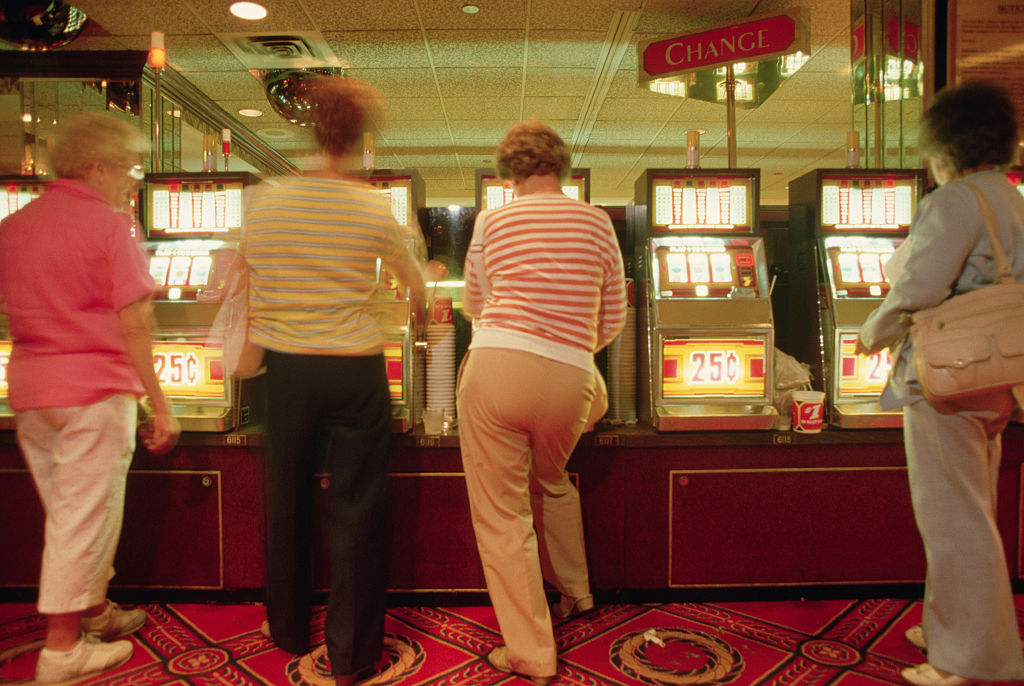
The video slots seem to captivate older women especially. Most play by themselves, some gesture at and talk to the screens, many smoke, and in truth, it doesn’t look the least bit fun. Younger men play two and three at once. Very few couples sit together to game. Those who do don’t hug or celebrate, just wait, fidget and ignore.
Deeper in the din, the machines change. Genghis Khan and his Silk Road Mongols, wily prospectors leading gold-rush donkeys, living tiki towers being climbed by monkeys. Happy whales strapped with barrels of coins, supernatural serpentine disco queens. Wise-eyed tigers, glowing phoenixes, talking kangaroos, and diamond griffins.
After 30 minutes of wandering and gawking, I’m being sized up by security. In no mood to chat, I swing for the fences and blow my Lucky Streak credit on Genghis, then spend 5 more minutes searching for boardwalk exit. The last player I pass tells the screen, “Yes….beautiful!”, then, “No…fuck!”
Outside, I eavesdrop for a while on distressed players leaving Bally’s: “It seemed a good idea, didn’t it?”…”Don’t ask me, it wasn’t my card!”…”She promised she’d meet us, that was yesterday morning“…”Seriously?? Well, fuck you then!”…”I didn’t make you come here, did I?”
And a young girl to her mom, “What if we want to die?”
I encounter a three floor mega-mall on a pier that once held 170 shops and restaurants. It now holds 17, but for some reason, its sprawling, empty wings are kept lit, clean and accessible. Inside is trippy, dreamlike. Winding corridors lead to empty food courts full of dated ads. There’s an open candy store, a sports store, happy voices reverberate from somewhere, but this is freaky.
Directly across the boards is Caesars. The iconic, story-high Julius fountain in the main thoroughfare is drained, with no sign of construction. Regardless, business in the entry is jumping, luxe shops and restaurants are as busy as I recall them in the 2000s. Twentysomething clubbers abound, gaming tables are semi-occupied, but video slots still rule the palace.
Just the same damn jingles and dings as Bally’s though.
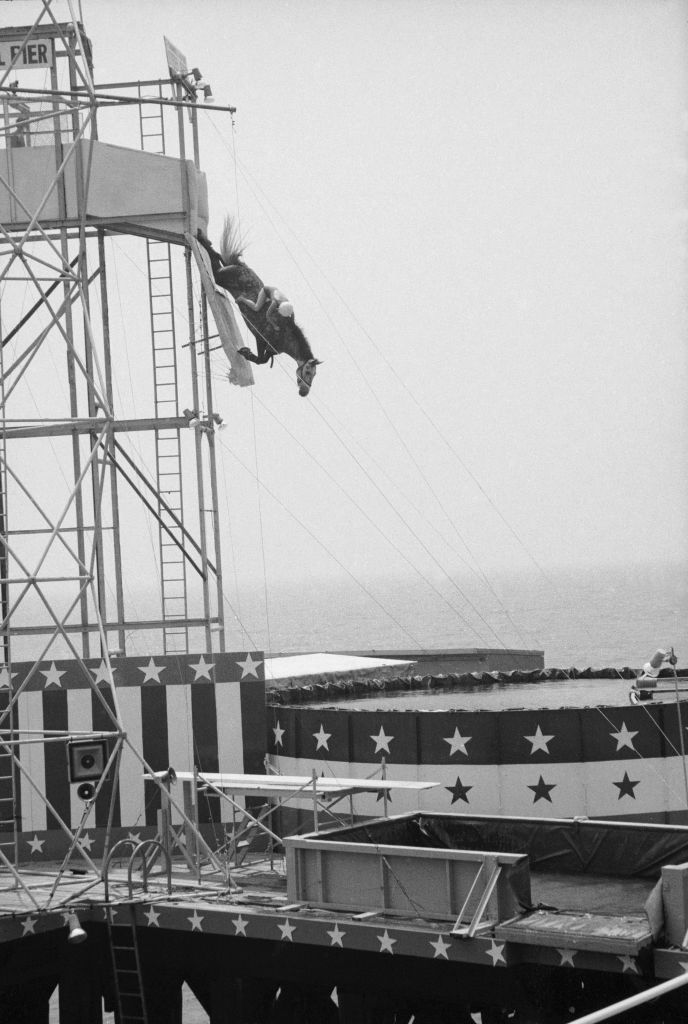
The Atlantic City Convention Hall was built in 1926 as the world’s largest indoor space. Next to it, an absolutely massive fenced-in lot, is the gravesite of the Trump Plaza, imploded after shedding chunks of itself onto Pacific and Mississippi avenues, hundreds of feet below.
As I ponder dodging tons of concrete, a lo-fi dial tone screams across town. Many on the boards are visibly alarmed. Others aren’t, likely locals, so I inquire. It’s the 10 p.m. teen curfew alert, sent using AC’s weather emergency siren, a near-nightly occurrence since 2021. My gut says to head home, and on the way I encounter a busker costumed as the Tin Man. He’s counting the day’s haul.
THE NIGHTCAP
At Tony’s I seek the back of the bar, where nature’s light has never reached, past the red Naugahyde booths with mini-jukes, past the stools on the red-and-black checkerboard floors. There, a genial-faced guy in an M65 coat (the Travis Bickle kind), high-cut swim trunks and work boots, is waiting to order. He seems local, so I present myself and buy us whiskeys.
His name is Dean, former Taj Mahal bartender. He shows me a wallet pic from ’93. He looks like a Ken doll. He says he knew Trump, that Trump walking through the Taj was like Christ entering Jerusalem, on that donkey, when they threw the palms at him. Trump once tipped him a hundo on a soda, he had him sign it and framed it. In 2006, he shattered it with a shoe and bought frozen pizza.
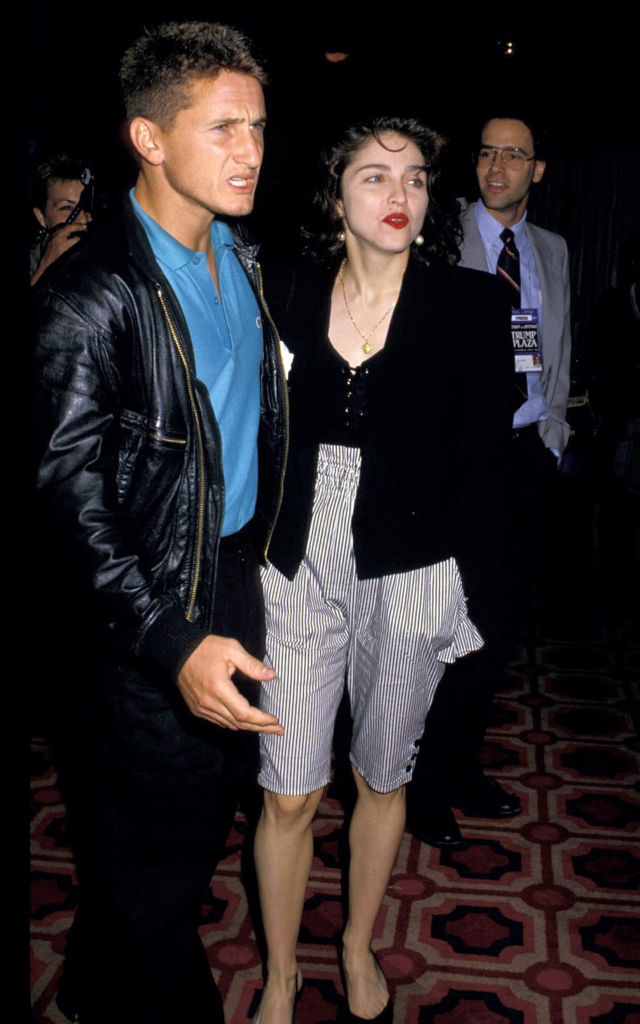
I ask about the streets, he says to call it a night. His visiting cousin got mugged last week, lost his wallet, his shoes and two teeth. If I need to see more of the mess, check this Instagram account, “AC Crust Kings”. He plays an up-close vid of a shot guy moaning, blocks north of us. Another of a dead woman on the ground, blood running like rainwater where the street meets the curb—a hell of a lot of blood for one person.
It’s not all death he says, Crust Kings has oddballs to gawk at too. Like this one, he’s seen him, a one-toothed Asian fellow with a ”Fuck Da Cops” forehead tattoo. He goes by AC Chinaman. In the video he smokes something incredibly fast, dumps a Natural Ice on himself, howls and runs off, pushing a little person in a leprechaun suit laying face-down on a skateboard.
To help plot your holiday, here’s CrimeGrade’s crime per capita map of Atlantic City.
Crust Kings has kind people too, street saviors. It’s a small city, Dean tells me. The good people here are amazing, the bad people are evil, and many don’t know who or where the hell they are. His friend volunteers at the shelter, one of South Jersey’s only, and says bougie-ass Ocean and Burlington counties have been one-way bussing their homeless here forever (and he’s right). I buy Dean a whiskey, we hug, and I head upstairs to dream of brighter shores.
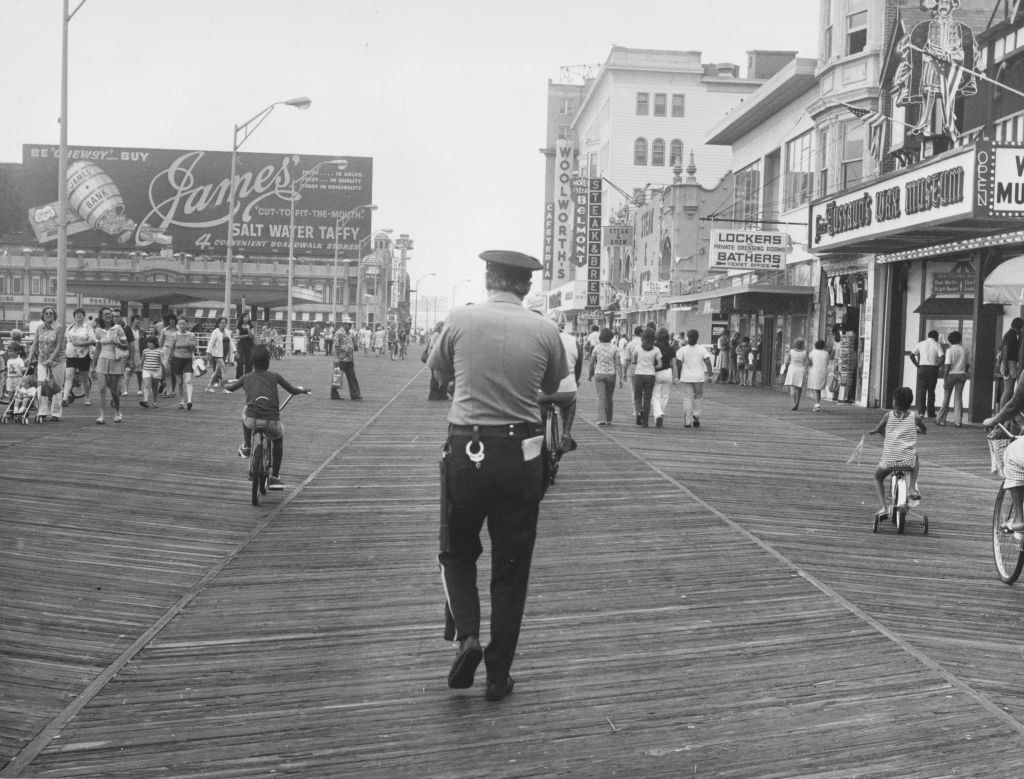
THE RECKONING
Atlantic City’s potential death knell may appear to be Manhattan resort casinos, but a graver threat exists. Atlantic City is essentially sinking. Having been erected on marshlands and barrier islands using early land reclamation techniques, its waterlogged ground is now compacting in a process called subsidence. The numbers aren’t pretty.
As one of the most vulnerable coastal cities in the nation to flooding, its sea level has risen 1.5 feet since 1911—double the world’s average. Of any coastal state, Jersey has the highest projected building value loss from flooding—over $605 million annually. A study in Nature found that $20 billion worth of AC properties, including 9,700 homes, are likely to flood by 2050. In a city of only 48 blocks.
A pastor friend has framed the situation as such: While Old Testament God, the fiery vindicator, obliterated cities of sin Sodom and Gomorrah with sudden acts of nature, patient New Testament God, having given greedy casino bosses a half-century to enrich Atlantic City as a whole, now seems to be subjecting their den of vice to an achingly slow drowning.
He must like Vegas though.
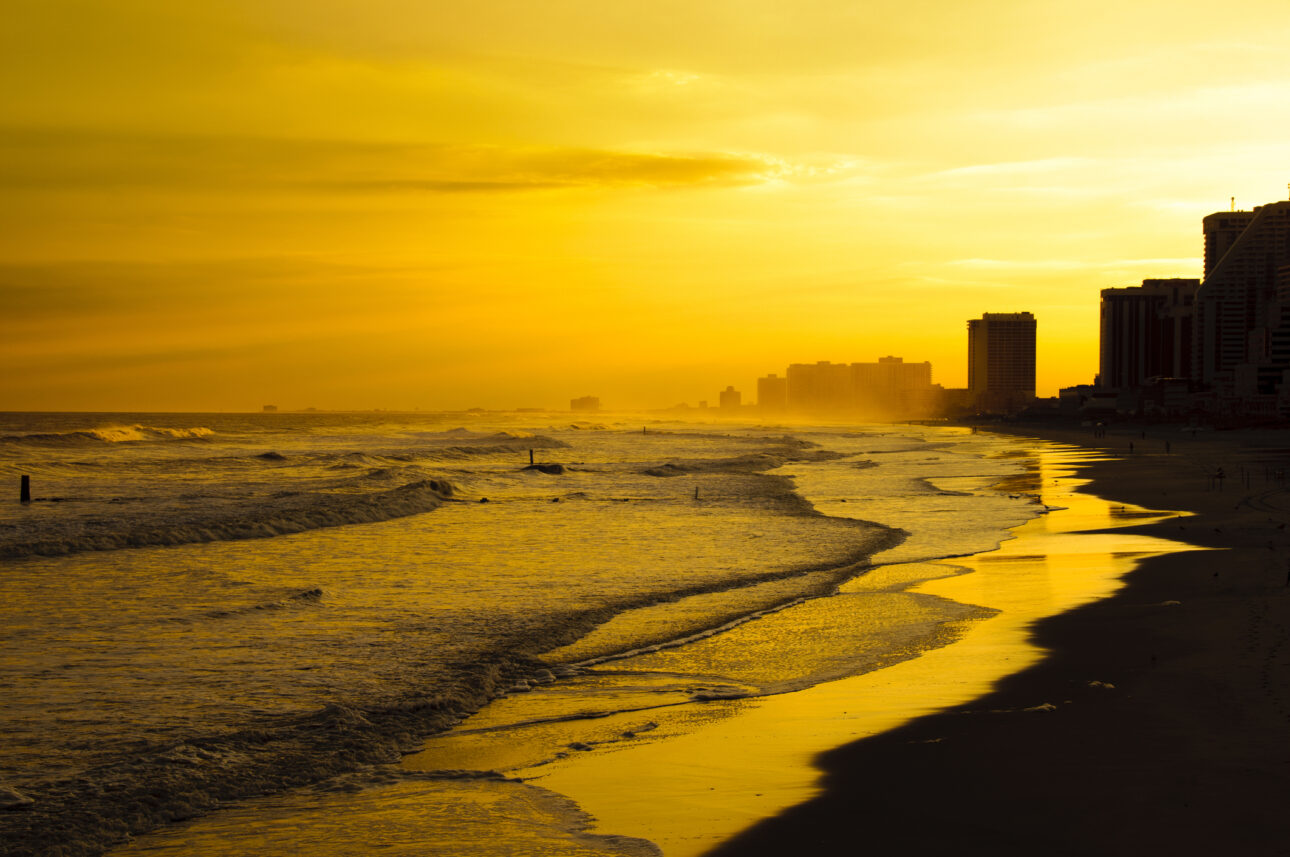
Link to the source article – https://www.spin.com/2024/12/the-wash-out-of-atlantic-city/
Recommended for you
-
M-Audio AIR 192×4 USB C Audio Interface for Recording, Podcasting, Streaming with Studio Quality Sound, 1 XLR in and Music Production Software
$119,00 Buy From Amazon -
XSONIC Airstep Spk Edition Spark 2&40&Mini&Go&Live&EDGE Foot Controller with 5 Footswitches, 4 Control Modes, 300H Playtime, Hands-free control of Spark for Home and Gig
$76,49 Buy From Amazon -
IK Multimedia AXE I/O One – Professional USB Audio Interface with Z-TONE advanced guitar tone shaping, AmpliTube and TONEX software included, high-resolution recording studio equipment
$129,99 Buy From Amazon -
Yamaha YRA-312B Alto Recorder, simulated Rosewood finish, Key of F
$37,04 Buy From Amazon -
Adam Audio Sub10 Mk2 Powered Studio Subwoofer Black
$1.499,99 Buy From Amazon -
Type C Charger Fast Charging, 2 Pack USB C Android Phone Wall Charger Block & 6ft Charge Cable Cord, for Samsung Galaxy S8 / S9 / S10 Plus Active S10e, S20 / S21 Ultra Plus, Note 8 9 10, Pixel 3 etc
$14,99 Buy From Amazon -
Mendini By Cecilio Violin For Beginners, Kids & Adults – Beginner Kit For Student w/Hard Case, Rosin, Bow – Starter Violins, Wooden Stringed Musical Instruments
$0,00 Buy From Amazon -
ROCKSOCKI Electric Drum Set, 7-Pad Kids Electronic Drum Set with Headphone Included, Roll-up Drum Practice Pad, Great Holiday Xmas Birthday Gift for Kids
$46,99 Buy From Amazon














Responses